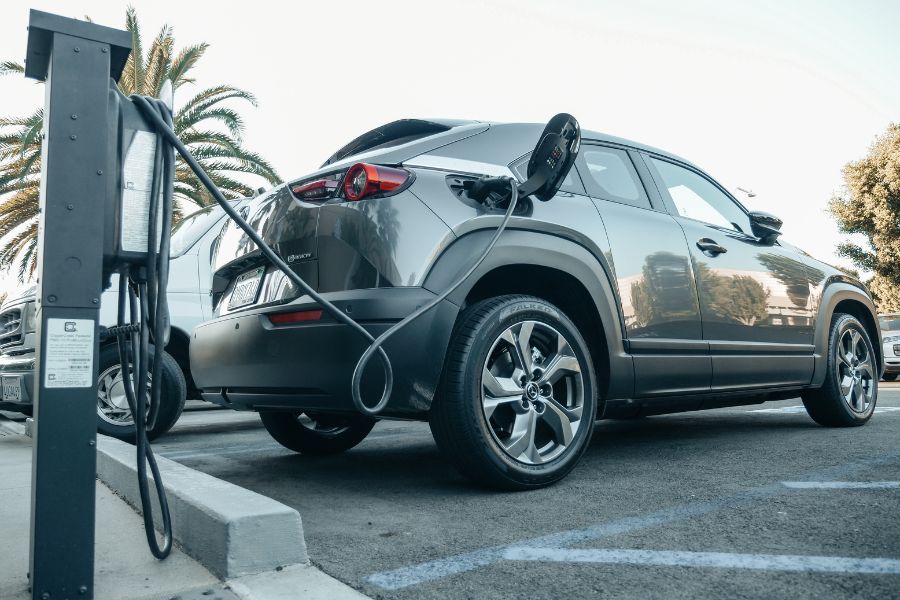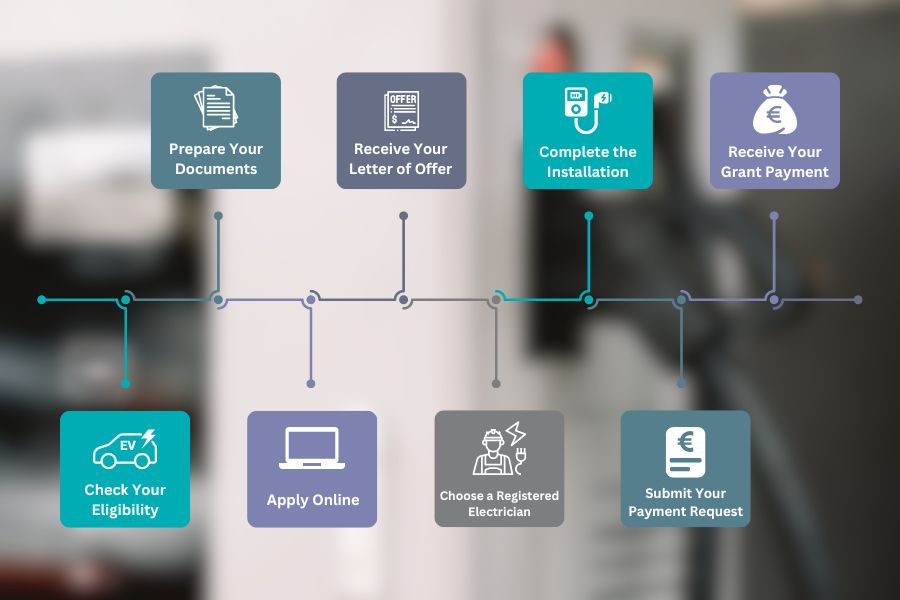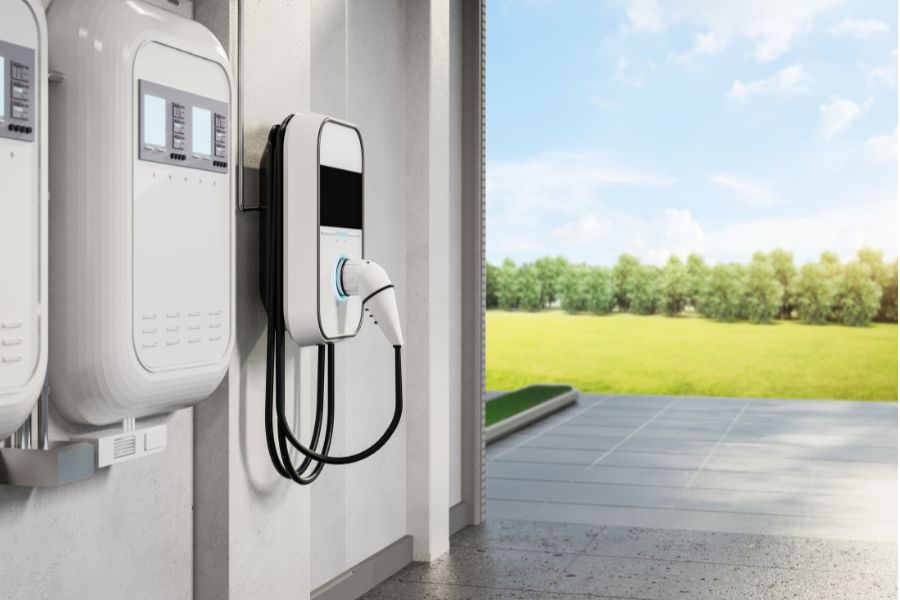Ireland’s EV Home Charger Grant is a powerful catalyst for adopting electric vehicles. It offers financial assistance covering up to €300 of the costs of installing a home charging point. This initiative by the Sustainable Energy Authority of Ireland eases the transition to electric mobility and enhances EV owners’ convenience. In addition, it reinforces the nation’s commitment to a cleaner, greener future in transportation.
What Is the Current State of Electric Vehicles in Ireland?

The Irish government has been actively promoting the use of electric vehicles through various initiatives and incentives. These include grants for purchasing electric cars and installing electric vehicle home chargers. It also provides tax benefits such as reduced Vehicle Registration Tax (VRT) and lower motor tax rates for EV owners. Before applying for the EV home charger grant, learn more about the different types of home chargers for electric cars in Ireland.
The government has provided grants for electric vehicle home chargers to encourage the installation of electric vehicle charge points at residential properties. The Electric Vehicle Home Charger Grant offers homeowners financial assistance to install a home charging point. Furthermore, this grant aims to make it more convenient for EV owners to charge their vehicles at their residences.
Individuals can typically complete a payment request form to apply for the electric vehicle home charger grant. They can then submit it with the necessary documentation to the relevant authorities. The donation helps cover some of the purchasing and installing the home charger.
When considering the installation of an electric vehicle home charger, it’s crucial to have an appropriate off-street parking location, such as a driveway or private parking area. Besides, this ensures the safe and convenient charging of the electric vehicle at home. Considering the benefits of the EV home charger grant, it would be helpful to understand the cost of EV charger installation in Ireland.
It’s worth noting that in addition to electric vehicles, the Irish government has also provided previous grants for plug-in hybrid electric vehicles (PHEVs). These vehicles combine an electric motor with an internal combustion engine and can operate on electricity and traditional fuels.
The availability of charging infrastructure, including a public electric vehicle charge point, has been expanding in Ireland. These charge points are in various locations, such as public car parks, workplaces, and major road networks. The government aims to continue improving the charging network to accommodate the growing number of electric vehicles on the road.
How Does the EV Grant Scheme Works?
The Sustainable Energy Authority of Ireland (SEAI) manages a government-funded support scheme for installing electric vehicle (EV) home charging stations in Ireland.
EV grant scheme works when you own an EV, which could be a new or second-hand Battery Electric Vehicles or Plug-in Hybrid Vehicles. The vehicle must be registered for private use and purchased on or after January 1, 2018. If the property has availed of a previous EV vehicle grant or was part of the ESB Ecars home charger scheme pre-2018, it won’t be eligible for this grant.
Here, you can access a comprehensive resource providing public service information in Ireland, including details on electric vehicle grants and installation.
Choosing a professional to install a modern electric power shower or upgrade your fuse board is necessary. Moreover, you must select an installer for your EV charger from the SEAI’s registered list of EVSE installers, available on the SEAI’s website.
Once you’ve confirmed that your home, equipped with its off-street parking facility, is suitable for a home charging unit, you can apply for the grant on the SEAI website. We’ll discuss more about the application process in the following paragraphs.
If your grant application is approved, you will receive an offer letter, after which you can proceed with the installation. The grant payment, which helps reduce your overall cost, is typically made directly to the installer. This grant can cover up to €300 for purchasing and installing a home charger unit.
Once the installation is complete, your installer must submit a completed declaration of works form on your behalf to the SEAI to confirm the installation. After you have completed the completed payment request form, you will receive grant support via the grant payment.
How to Apply for the Home EV Charger Grant in Ireland

To apply for the Home Electric Vehicle (EV) Charger Grant in Ireland, follow these steps:
Check Your Eligibility
Confirm that you meet all the Sustainable Energy Authority of Ireland (SEAI) criteria. You should own an eligible electric vehicle, have off-street parking, and the charger should connect back to your home. The property should have been separate from a previous EV home charge point grant or have availed of the free ESB Ecars home charger pre-2018.
Prepare Your Documents
You will need your Meter Point Reference Number (MPRN) from your electricity bill to confirm your home’s location and your home address Eircode.
Apply Online
Visit the SEAI’s website and fill in the online Electric Vehicle Home Charger grant application form using your MPRN and Eircode.
Receive Your Letter of Offer
Upon approval of your application, the SEAI will send you a Letter of Offer, Terms, and Conditions, and a Payment Request Form link via email. You will also receive an Installation Details form that your electrician must fill in. Remember to start work after the start date mentioned in your Letter of Offer.
Choose a Registered Electrician
An electrician registered with Safe Electric Ireland is the only one who should perform the installation work.
Complete the Installation
Once your electrician has completed the installation, they will provide you with a copy of Certificate Number 3. You have six months from your Letter of Offer to complete the installation.
Submit Your Payment Request
You must submit a signed copy of Certificate Number 3 and the Payment Request Form. In addition, you should also submit a Test Record sheet from the electrician, copies of invoices, and photographs of the installed charge point. Your electrician should send a completed copy of Certificate Number 3 to Safe Electric Ireland.
Receive Your Grant Payment
Once SEAI confirms that your electrician is fully approved and registered and filing the relevant certificate, they will process the grant payment to the bank account details you provided.
Please note that the application processing time is approximately 6-8 weeks from when the SEAI receives your documents. You can get more details on the SEAI resource here.
Impact the EV Home Charger Grant Had on EV Adoption in Ireland?

Based on general trends, this incentive would positively influence the adoption of electric vehicles (EVs) in Ireland. Again, this grant removes a significant barrier to EV adoption by reducing home charging infrastructure costs. It is one of the critical considerations for potential EV buyers.
Factors that might have amplified the positive impact of the grant could include:
- Increasing awareness and concern about environmental issues, leading to greater interest in low-emission transport.
- The growing range and affordability of EVs in the market.
- Rising petrol and diesel costs make EVs more appealing from a running-cost perspective.
- Improvement in public charging infrastructure that complements the home charging facilities.
On the other hand, there could still be barriers to EV adoption, such as the initial high cost of EVs compared to traditional cars, the range of EVs, and the need for more widespread and reliable public charging infrastructure.
It’s also worth considering that related government policies and incentives could influence the impact of the grant. For instance, the combined effects could significantly boost EV adoption if there are generous subsidies for purchasing EVs and tax benefits for EV owners.
Pros and Cons of the EV Home Charger Grant in Ireland
Pros
- Financial Incentive: The grant can significantly reduce the cost of purchasing and installing a home charger, which can be expensive. Equally important, this makes EV ownership more affordable.
- Convenience: A home charger makes charging an electric vehicle much more convenient. Owners can charge their cars overnight and start the day with a full charge.
- Promotes Electric Vehicle Usage: The grant incentivizes people to purchase electric vehicles, which can reduce greenhouse gas emissions and air pollution. Furthermore, they contribute to better public health and environmental outcomes.
- Economic Growth: Increased demand for electric vehicles and home chargers can stimulate growth and create jobs in these industries.
- Energy Independence: By promoting the use of electric cars, Ireland can reduce its dependence on imported fossil fuels.
Cons
- Limited Accessibility: The grant may only apply to homeowners with private parking. It could leave many people living in apartments, rented houses, or houses without a dedicated parking space.
- High Initial Costs: Even with the grant, the initial cost of buying an electric vehicle and installing a home charger can be prohibitive for many households.
- Possible Inequity: Grants like this can sometimes disproportionately benefit wealthier families. They help those who are more likely to be able to afford an electric vehicle in the first place.
- Infrastructure Challenges: The existing electrical infrastructure might not be able to support a significant increase in home charging, which could require costly upgrades.
- Dependence on Electricity Generation Sources: One could offset the environmental benefits if the electricity used to charge the vehicles comes from fossil fuels.
Conclusion
In a nutshell, Ireland’s EV Home Charger Grant is a solid boost to electric vehicle adoption. How? Well, by footing a portion of the bill for installing home charging points. It isn’t just a win for your pocket—it’s a step towards a greener Ireland.
Charging at home becomes more manageable and cheaper, which sweetens the deal of owning an electric vehicle. Plus, knowing that approved pros carry out every installation is peace of mind.
So, this grant isn’t just making EV ownership more accessible; it’s also contributing to Ireland’s eco-friendly goals.
Overall, the EV Home Charger Grant scheme fuels the drive towards a sustainable, electric future, one home at a time. And that’s something we can all get charged up about!
